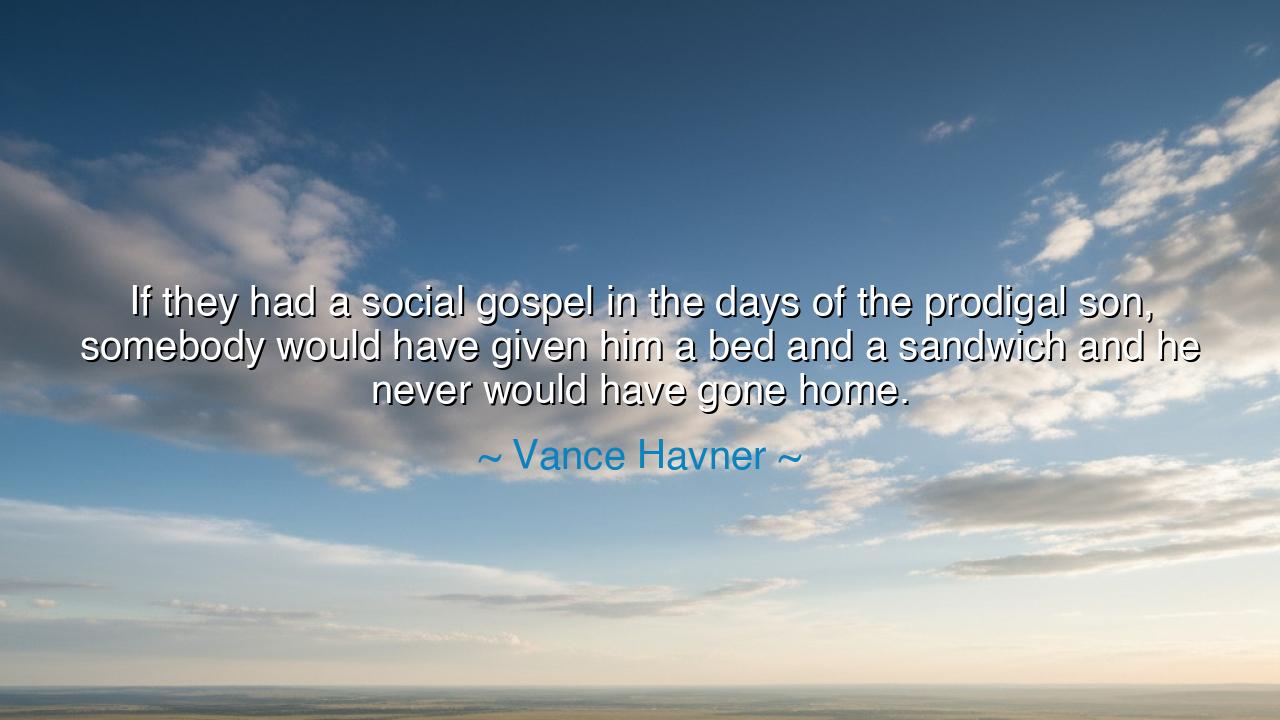
If they had a social gospel in the days of the prodigal son
If they had a social gospel in the days of the prodigal son, somebody would have given him a bed and a sandwich and he never would have gone home.






The preacher and prophet Vance Havner once said, “If they had a social gospel in the days of the prodigal son, somebody would have given him a bed and a sandwich and he never would have gone home.”
This statement, sharp as a sword and filled with divine irony, cuts straight to the heart of human nature and faith. In it, Havner warns against the temptation to ease the discomfort of the soul before it has learned its lesson — to offer comfort in place of conversion, relief in place of repentance. His words are not a rejection of compassion, but a call to spiritual discernment: to recognize that sometimes the pain of hunger, the cold of loneliness, and the despair of failure are not curses, but instruments of grace leading the lost home.
The origin of this quote lies in Havner’s reflections on modern Christianity and the rise of the “social gospel” — a movement focused on addressing poverty and injustice through human effort and good works. Though noble in its intentions, Havner saw in it a danger: the tendency to heal the surface while leaving the soul untouched. He looked back to the parable of the prodigal son, told by Jesus, in which a young man demands his inheritance, squanders it in reckless living, and falls into ruin — feeding swine, starving, and alone. It is only in his lowest moment that he “comes to himself,” realizing the depth of his folly and choosing to return to his father’s house. Havner’s point is piercing: had someone rescued the prodigal too soon — given him shelter, food, and comfort — he might never have felt the holy desperation that drove him back to his father’s embrace.
This teaching echoes the wisdom of the ancients, who understood that suffering can be a teacher more faithful than comfort. The Stoics taught that the fires of hardship refine the soul as iron is forged in flame. The Scriptures say, “Whom the Lord loves, He chastens.” Even the Buddha, walking through his own renunciation, discovered that freedom came not from indulgence nor from escape, but from enduring the struggle of awakening. Havner’s words stand in that lineage — the wisdom of the refining pain, the truth that mercy without purpose can cripple rather than heal.
To see this truth in life, we might remember the story of John Newton, the 18th-century slave trader who later became the author of Amazing Grace. Newton was not rescued by comfort but by conviction. In a storm that threatened to sink his ship, he faced death and saw his own corruption. That moment of terror became his turning point — his “pigpen,” as Havner would say — and from it came repentance and transformation. Had someone softened his pain too soon, he might have remained blind to his own need. His life, like the prodigal’s, proves that sometimes the road home begins with the fall.
Havner’s warning, however, is not against compassion itself — for compassion is sacred. Rather, he speaks against the misguided mercy that seeks to spare people from the very suffering that could save them. The heart of his message is discernment: knowing when to comfort and when to let consequence do its holy work. There is a difference between healing a wound and numbing it. The former restores life; the latter merely delays death. In our haste to help, we must be wise enough to ask — will this kindness bring them home, or keep them wandering longer in the far country?
This truth applies not only to others, but to ourselves. How often do we rush to silence our own pain — with distractions, pleasures, or excuses — instead of asking what our suffering is trying to teach us? Every sorrow, every failure, every loss carries within it a message from the Divine: Come home. To deny that message is to wander longer in exile. Havner reminds us that true grace is not the soft blanket that lulls us back to sleep, but the awakening fire that drives us back to God.
So, my child of compassion and discernment, take this teaching into your heart: do not rescue the soul from its redemption. When others stumble, offer love, yes — but also truth. Let your mercy be strong enough to wait, patient enough to trust that even the pain has purpose. And when your own spirit is weary, when life feels barren and cold, do not curse the famine — it may be leading you home.
For as Vance Havner teaches, sometimes the hunger of the heart, the ache of the conscience, and the emptiness of the world are not punishments, but invitations — the hand of the Father reaching across the distance, calling His children back to where love and life begin. Let the soul travel its road. Let it learn, weep, and rise. For only then will it truly understand the sweetness of coming home.






AAdministratorAdministrator
Welcome, honored guests. Please leave a comment, we will respond soon